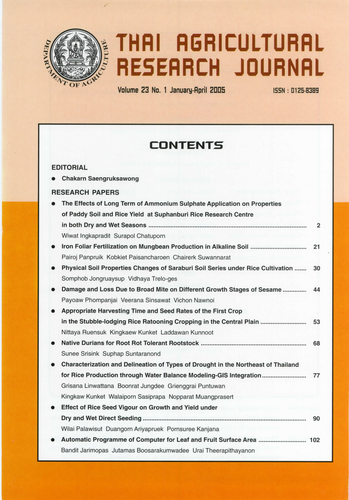The Effects of Long Term of Ammonium sulphate Application on Properties of Paddy Soil and Rice Yield at Suphanburi Rice Research Centre in both Dry and Wet Seasons
DOI:
https://doi.org/10.14456/thaidoa-agres.2005.1Keywords:
ammounium sulphate, rice, suphanburi 1Abstract
The effect of ammonium sulphate fertilizer in long term application on non- photosensitive rice varieties growing in both wet and dry seasons. The trials have been conducted on Pimai soil series (very fine clayey, mixed vertic tropaquepts), at Suphanburi Rice Research Center, Suphan Buri province. The experiments have been established for the past 34 years by commencing form dry season in 1968 to wet season in 2002 to investigate the effect of long term application of ammonium sulphate fertilizer on the soil chemical changes and yield of rice. Lt was designed as a split plot in RCB with 4 replications. The treatments were comprised 3 non- photosensitive rice varieties as main plot and 7 rates of chemical fertilizers as a subplot namely 0-0-0 0-6-6 3-6-6 6-6-6 12-6-6 and 18-6-6 of N-P2O5-K2O kg/rai of the first experiment. The varieties have been changed periodiocally according to the popularity of each. The second experiment had the same rate of N-P2O5 without K2O application as a subplot. In 1999, the results of the both experiments were indicated that soil pH was markedly decreased as the rate of ammonium sulphate application increased. In addition, soil organic matter contents was also increased as ammonium sulphate application increased. However, the available P2O5 concentrations of the soil was decreased as ammonium sulphate supply increased. Whereas, the extractable K2O concentrations of the soil was not changed that was compared to the control treatment
Downloads
Published
How to Cite
Issue
Section
License

This work is licensed under a Creative Commons Attribution-NonCommercial-NoDerivatives 4.0 International License.
Thai Agricultural Research Journal



